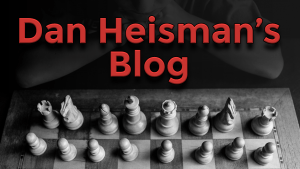
Is Speed Chess Good For You?
Yes.*
*Speed chess is good for you (meaning it can help your slow chess, too) but doing it "incorrectly" could be harmful.
Let's digress...
A few years ago our Main Line Chess Club hosted a seminar by WGM Jennifer Shahade.

At the end of her talk, Jen took questions from the members and one was:
"I suppose you think blitz is bad for you?!"
Jennifer's immediate response was "No! I think blitz can be very good for you..." and then she paused.
"...but if you don't look up your openings after the game you are missing most of the point."
I almost gave her a standing ovation.

Several years ago I wrote a column "Getting the Edge" where I listed several activities that some of my students don't do for one reason or another. For each activity, I listed how doing those things would help you and, more important, how not doing those things might cause problems.
One of the activities I listed was playing speed chess. I recommend that if you are a beginner, you should avoid speed chess for a variety of reasons. Among them:
- it can get you into a variety of bad habits,
- cause inexperienced players to rush in slow games, and
- can be very frustrating when you are not very good and can't see the chessboard very accurately in a short glance.
However, once you get good enough to have sufficient board vision and tactical vision to play speed games, I do recommend you add them to your practice repertoire. This usually occurs in the 1200-1400 range, but of course can vary widely.
Having taught about 1,000 players privately, I have had a fairly large sample of students who did not play speed games. In general, these students demonstrated some, or possibly occasionally all, of the following problems in their slow games:
- Their tactical vision was slow. They often did not recognize easy tactics even if they were studying them. They just did not have the many opportunities you get in speed chance to quickly check to see if their candidate moves were unsafe moves plus the chance to quickly recognize when the opponents' moves were unsafe.
- They had extraordinary difficulties when they played too slow and got into time trouble. They were simply not used to having to make safe moves quickly (as per the first bullet). Moreover, psychologically, they tended to panic since they were not familiar with having to move quickly.
- They were much weaker in the openings than players who played many speed games and used them to both practice and look up their openings, as per the Jennifer Shahade quote above. After all, if you review your speed game afterward in a book, database, or with an engine, it's not going to say that the correct moves only depend on your playing slow games. For this purpose, playing speed games is identical to playing slow games with the added immense benefit that you can play dozens of speed games in a fairly short period of time, while it may take you months to play that many good slow games.
As an anecdote to this first bullet, I remember when I was an improving player and was playing the Najdorf Variation of the Sicilian Defense, then as now one of the most popular and "booky" openings. I would get into key theoretical lines in slow games realizing I had never played that line in another slow game. However, I knew exactly what the book ideas were because I had not only played those lines in a multitude of speed games, but I had looked up those openings in MCO-10, other books, Informants, and magazines. So I was a fairly experienced player in most of the popular lines, but in many cases had not yet played a slow game in many of them!
By the way, this is an excellent place to note that wherever possible, you should play speed games with the same increment or time delay as your important games. If you are going to play in the World Open with a 10-second time increment, don't practice speed games at 5 0 or 3 0. Instead play 2 10 or, if that is too slow, you can even play 0 10. But make sure that same time increment is there. That trains your brain on how much leeway you have each move when your time runs short.
In addition, it is important to note that race conditions (games with a zero increment or time delay like 5 0) are MUCH different than games with increments and time delays. Since for many years all important games have been played with increments and time delays, it makes sense to train your thinking to be as accurate and familiar as possible with the exact increment you will face).

This is illustrated by a story:
A few years ago, a young player approached me and said that he had been playing extensively on the internet, and felt he had a good chance to win some money in a lower section of the upcoming World Open. He wanted me to train him specifically for this event. I accepted him as a student and, in the first lesson, realized that his extensive speed play on the internet was at a different time increment than he would face in the World Open. So I suggested that at least for the time between then and the tournament he should restrict his speed play to only games with the same increment. Without any hesitation, he seemed to agree.
When I make a suggestion to a student, I also realize they are hiring me. Therefore, I work for them, they are the boss, and so there are really only three possibilities:
- They can agree it's a good idea and do it.
- They can disagree and, as the boss, tell me honestly that they are not going to do it. That's fine with me; they are the boss. I don't expect someone to like or follow every suggestion I make, since I make many of them.
- They can tell me they are going to follow the suggestion but then secretly ignore it.
As far as I am concerned, #1 and #2 are equally acceptable and build trust, but #3 has a tendency to erode trust, rather than build it.
The next day, in trying to further help my student, I again tuned into his internet games. To my dismay, I found that he was playing every speed game at his old increment, and not the one that I suggested would help him in the World Open. Nevertheless, I continued to coach him to the best of my ability to get him ready for the event.
In the first four rounds of the World Open, that student did very well and was among the leaders in his section. At that point, of course, he was paired against another leader, who also was a young man hoping for World Open cash. The game seemed pretty intense and both players fell into a time scramble. You can probably guess what happened. My student, for reasons that may or may not have been related to his being accustomed to a different increment, lost the game. Not only that, he became too discouraged (in the World Open almost everyone loses a game; how you recover is key) and played the remainder of the event with much less enthusiasm. He eventually finished out of the money.
After the final round of the event, I invited him to have dinner with me and some other students. On the way to the door, he said he forgot something and would join us at the restaurant.
Sadly, he never showed up and I never saw him again.

I'm not going to claim that his playing speed chess at a different increment than that of the World Open cost him prize money; I'm not a mind reader. However, it remains a simple conclusion that if you are going to practice for something, practicing what you are going to face during the event will leave you better prepared than practicing under some other rules.
Can too much speed chess be bad for you?
Can you become addicted to the adrenaline rush?
Too much oxygen can make you hyperventilate and too much water can make you drown. So, in that sense, almost anything can be bad for you if taken to extremes, but that does not make all those things bad if done reasonably.
One more interesting note about speed chess. As far as I know, the only top player in the past century who famously shunned speed chess was Mikhail Botvinnik. The world champion apparently was fond of saying that he had only played one (!!) speed game in his life. Apparently he was on a train to an event and his fellow chess masters goaded him into playing a speed game! That was his only one, and thus I assume he viewed speed chess as a sort of vice. However, pretty much every other top player probably played more speed games on their way to GM than most players play in a lifetime.
So, I will stand by my statement (and Jen's): Yes, if done reasonably, speed chess is good for you.






